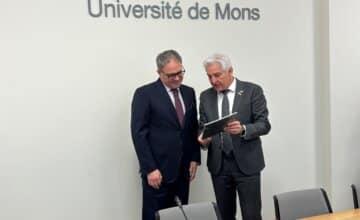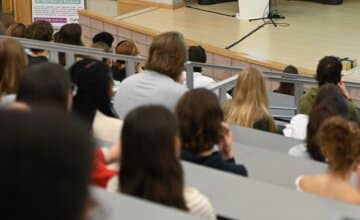UMONS and Jolimont, Partners in the New COVID-19 Screening Platform in Hainaut
At full capacity, the joint platform will be able to process 7000 tests per day, therefore playing a very active role in the fight against COVID-19 in Hainaut.
The Jolimont Hospital Group and the University of Mons have launched the activities of their joint COVID-19 screening platform for Hainaut which is associated with the Federal “Bis” platform.
Officially operational as of 01/11, this platform is one of eight new federal consortia of universities and hospitals across the country that together will double the national testing capacity to an additional 50,000 tests per day. At full capacity, the joint Jolimont-UMONS platform will be able to participate in this effort by processing 7000 tests per day. It will thus play a very active role in the fight against COVID-19 in the hard-hit province of Hainaut, for the benefit of the region’s hospitals, their patients and their staff.
On Monday 26th October, Sciensano audited the Jolimont-UMONS consortium for its COVID-19 screening platform. This platform is one of 8 national consortia combining the skills of teams from a university and a certified biology laboratory, as are the consortia established between ULiège and CHU Liège, UAntwerpen and UZA, UCLouvain and Hôpital Saint Luc Bruxelles, ULB and IBC, UGent and UZ Gent, KULeuven and UZ Leuven, and UNamur and CHU-UCL Namur.
The audit highlighted “the professionalism with which this platform has been implemented and is managed”, adding that “the structure proposed” by the two partners and hosted in the Jolimont hospital in Haine-Saint-Paul “provides the necessary guarantees to enable the platform to start up, in accordance with the expected requirements”.
Sciensano has therefore given its approval for the launch of this platform, which will be capable of processing 2000 tests per day from the start of its activities, gradually increasing to an estimated capacity of 7000 tests per day by mid-January. To achieve this, the Jolimont-UMONS consortium will operate 7 days a week, including public holidays, for a minimum period of 24 months. Results will be provided within 24 to 36 hours.
It is important to remember that this type of platform is not open to the general public. It processes and analyses samples from laboratories, hospitals and other sampling centres. In concrete terms, the UMONS and Jolimont teams will screen for the presence of the Sars-Cov-2 virus by PCR from the nasopharyngeal swabs sent to them. On arrival at the Jolimont premises, the secure containers will first be decontaminated before the samples can be processed and the RNA extracted in order to be able to confirm or refute, via chemical reaction, the presence of the COVID-19.
This entire process will be strictly regulated by a permanent quality assessment system. In this partnership, the teams from the University of Mons, who had already implemented a pilot platform between March and June of this year, will take care of the entire analytical aspect (RNA extraction, RT-qPCR, interpretation of PCR analyses and the transfer into the information and management system (LIMS). The Jolimont specialists will be in charge of the entire pre-analytical part (reception of samples, storage, labelling and encoding) as well as the validation and transmission of results to Sciensano and the overall quality control of the process.
To keep the teams operational, UMONS has recruited 15 lab technicians and Master students, who have been or are in the process of being hired. These staff are under the supervision of Dr. François Dufrasne and two other post-docs for the different operational aspects as well as the training of staff for the technical and scientific aspects of the different analytical tasks. Prof. Ruddy Wattiez from UMONS and Dr. Laurent Boon-Falleur from Jolimont are responsible for the overall coordination of the UMONS/Jolimont platform.
The laboratories of the Jolimont Hospital group are also in the process of building up a team: so far, 20 secretaries have been hired or are in the process of being hired to carry out all pre- and post-analytical tasks, and this team could still grow. The operational coordination is ensured by Mr Donald Dassesse, administrative manager of the laboratories. Ms Caroline Debecker, the biologist in charge of molecular biology, and Ms Dung Khuu, the Quality Assurance Manager, will ensure the biological and qualitative supervision of the entire process.
Scientific equipment and reagents have been made available by the Federal Government to run this platform:
- Automatic sampling tube opening and closing machines
- Automated sample collection system
- RNA extraction robot
- Equipment for quantitative RT-qPCR
- PCR sample plating device
- Biosafety cabinet for viral inactivation of samples.
The financial intervention of the federal government and the INAMI also covers personnel and operating costs.
The activities of the Jolimont-UMONS platform could eventually evolve towards other types of tests (based on saliva samples, for example), depending on the new validated testing methods available and following a proposal by Sciensano.
Prof. Ruddy Wattiez, Vice-Rector for Research at UMONS, who was already involved in the first screening platform set up on the university’s premises in partnership with the CHU Ambroise Paré hospital, was mandated in August 2020 by the federal government to take the necessary steps to set up this platform in Hainaut.
Given that the Jolimont Hospital group has an accredited clinical biology laboratory that already performs COVID-19 detection tests, this partner was chosen by UMONS, thus completing the interactions with the Hainaut hospitals with which the University usually works (Ambroise Paré, Epicura, ChWapi).
For this platform, Jolimont is providing a surface area of approximately 300m², previously occupied by other healthcare activities. This means that these activities had to be moved and the premises reallocated. The furniture was recovered and manufactured in-house, in order to enable the platform to be set up quickly while guaranteeing quality. The equipment for the pre- and post-analytical phases mainly consists of computer equipment, as well as the environment required to process and inactivate the samples. The Jolimont laboratories are thus continuing, in collaboration with UMONS, the work carried out since March to make COVID-19 PCR tests available to carers and patients (88,500 tests carried out so far).
The University of Mons’ efforts in the fight against the pandemic are not limited to this screening platform. Other initiatives are currently being carried out by UMONS researchers to better understand the pandemic and its physiological and psychological impacts.




